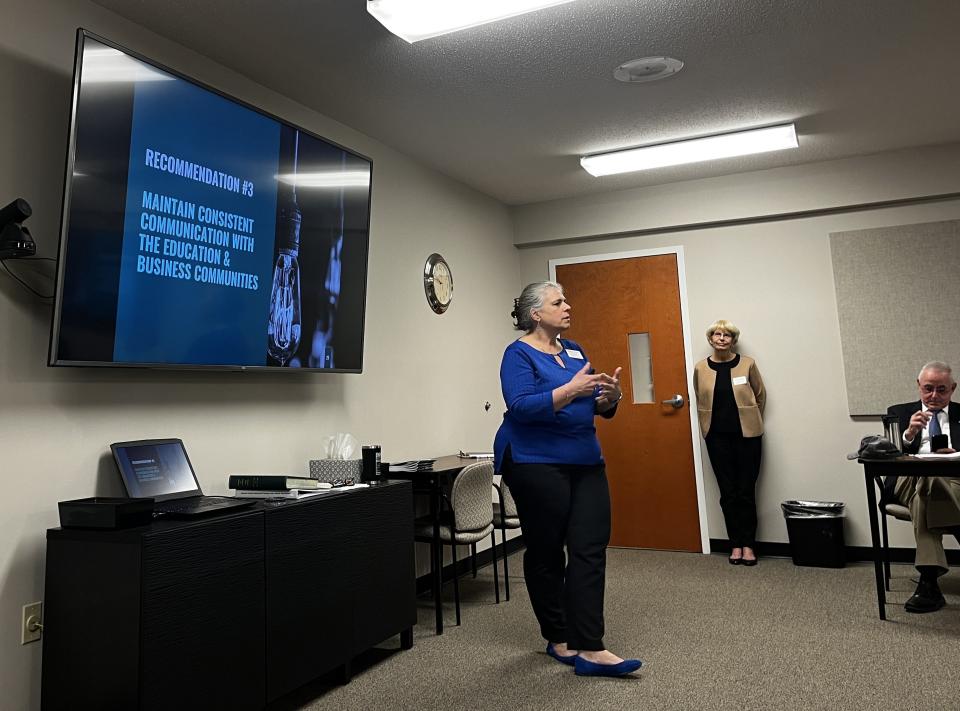Lebanon County leaders discuss next steps towards advanced training center
The Lebanon Valley Chamber of Commerce gave a presentation of its recently published Advanced Training Center Needs Assessment Wednesday morning to a group of educators, local leaders and elected officials, who later weighed in on the challenges and next steps of establishing a two-year training facility in Lebanon County during a round-table discussion.
Chamber President Karen Groh began by quoting a paragraph from the Trade and Technical Education Needs Report on Lebanon County from 1960, which described the same need in technical education that the county is facing today.
“This shows that for almost 75 years, this has been a struggle,” Groh said, “and it will continue to be a struggle because of the demands of our workforce and our employers, and our society changes all the time. But it’s just really important to note that this is not a new problem.”

Groh added that the study confirmed through data that there is a need for an advanced training center and allows further steps to be taken.
Groh stressed that while the study found workforce training needs weren’t being adequately met by educational institutions like the Lebanon County Career and Technology Center and HACC, it didn’t mean that they weren’t doing what they could.
Seats for secondary school students at LCCTC, for example, are divided by the size of the district, meaning that one district could receive three seats for a class, while another receives nine, meaning that many students don't get into their desired program.
Diane Harlow, director of workforce and education at the chamber, also noted during the discussion that the target audience for an ATC is post high school education.
"Remember, when you go to school outside your county," said Harlow, "the businesses that you're exposed to, the internships, the opportunities, the apprenticeships, are often not in your home county, they're in the county where you're doing your education. We feel that we may be losing some of our fabulous talent to those outside regions."
Groh also clarified that an advanced training center would be complementary to programs like Tec Centro Lebanon, a division of WEPA Empowerment Center, which provides employment services, ESL classes and plans to have workforce training programs later this year.
The group’s discussion landed on many topics and concerns, key among them was discussions about who should be in the conversation and making decisions for the next steps, as the establishment of an advanced training center would not be the chamber's project, rather they would be facilitators of the information.
Theresa Johnson, owner of Reconciliation Consulting Services, said she would like to see more transparency about what opportunities there are in the county, as well as more local stakeholders be a part of the conversation. She was particularly concerned with identifying barriers to training and employment with the community.
Through the discussion, a picture of what an ATC in Lebanon could potentially look like, began to take hold. While the exact model and physical location of the an ATC would be decided down the road, it would likely offer 2-year career-focused programs and require partnerships from outside institutions.
In one case, an Advanced Training Center could look like additions to existing infrastructure in the county such as the LCTCC or HACC.
It could also look like an outside organization coming into Lebanon County through partnerships, such as Thaddeus Stevens College or the Reading Area Community College.
Rep. John Schlegel said that no matter what they do, someone in the community would have to be the one to take charge of the conversation and decision making, recalling a similar need for a housing leader identified during discussions on the housing study, published late last year.
School districts were identified as among those that should be a part of ongoing conversations.
Daniel Larlham Jr. is a reporter for the Lebanon Daily News. Reach him at DLarlham@LDNews.com or on X @djlarlham.
This article originally appeared on Lebanon Daily News: Lebanon PA leaders discuss next steps towards advanced training center

